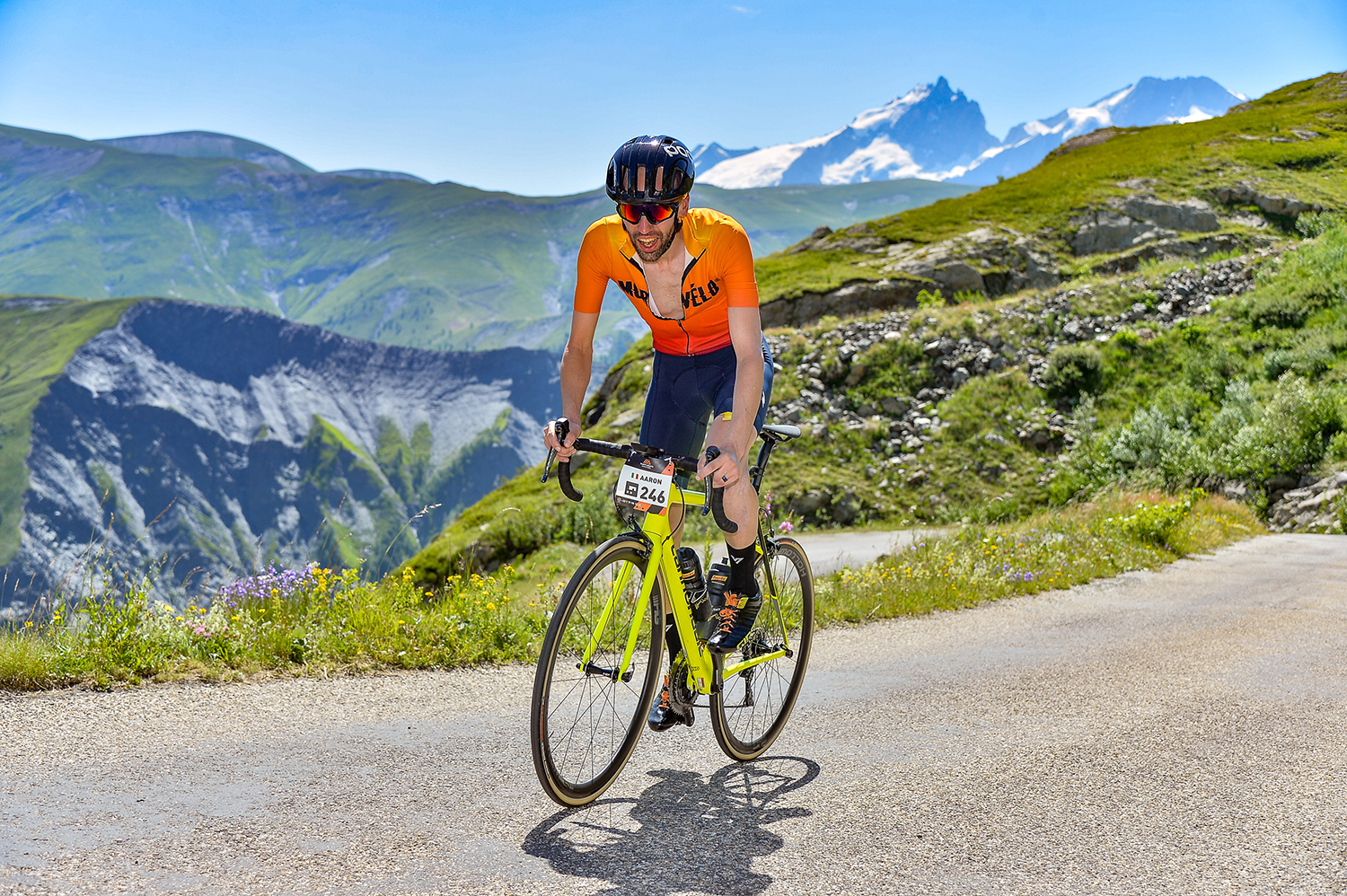2020 Cape Epic route revealed
The 17th edition of the Cape Epic is one of the toughest in recent years

For the first time in three years, the Absa Cape Epic returns to the western reaches of South Africa's Cape Peninsula. The route takes in the ultra-technical and often hostile trails of Tulbagh and Ceres, before snaking its way through the vineyards of Wellington and finally on to Stellenbosh over the eight-day, seven-stage race, covering 647km and 15500m of vertical ascent in the process.
Incidentally, the last time the route passed through this region back in 2016, it also traversed 647km and took in 14950m.
As far as metres per kilometre (m/km) go, 2020's route is one of the toughest in recent years - 24m/km versus 26.6 (2019), 20.5 (2018), 21.4 (2017) and 22.3 (2016). While the organisers have chosen to omit a mid-week time trial for next year and have included just one 100km-plus day (stage 4), stages 3, 5 and 6 are all very much on par in terms of difficulty, and each could pass as a Queen Stage in its own right.
The 2020 Cape Epic is scheduled for March 15-22 over what is traditionally the Western Cape's hottest period.
Prologue: Table Mountain
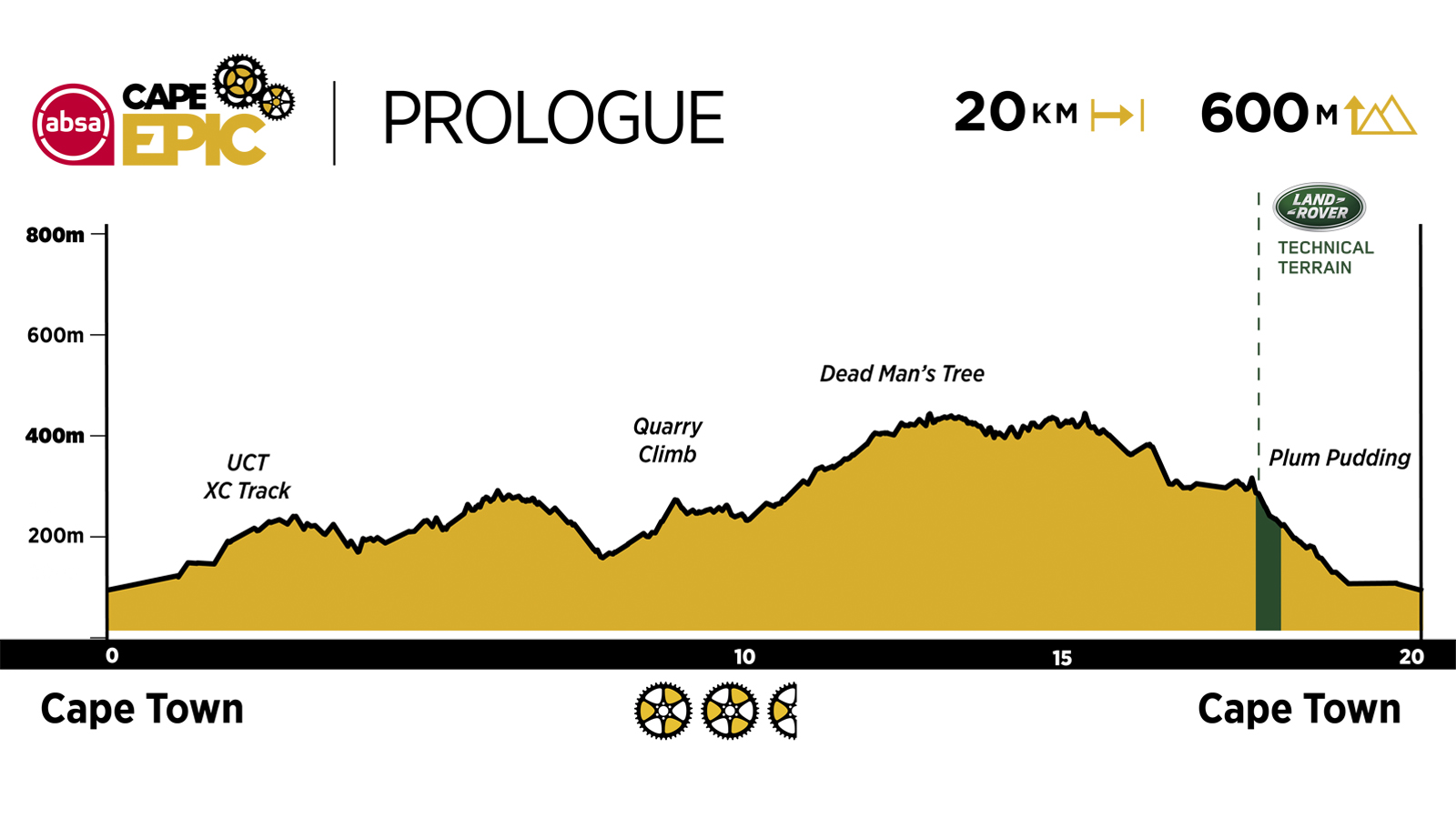
Sunday, 15 March 2020: 20km/600m
Table Mountain has been the home of the Cape Epic Prologue for the last three editions now and every year it continues to catch riders by surprise, often claiming the odd victim by way of a broken clavicle or bicycle.
An all-out cross-country-style effort, the 20km/600m profile may look innocuous on paper but what it fails to bring across is the type of terrain on offer: loose, washed-out singletrack, rocky off-camber descents and steep, punchy climbs.
Get The Leadout Newsletter
The latest race content, interviews, features, reviews and expert buying guides, direct to your inbox!
Stage 1: Ceres
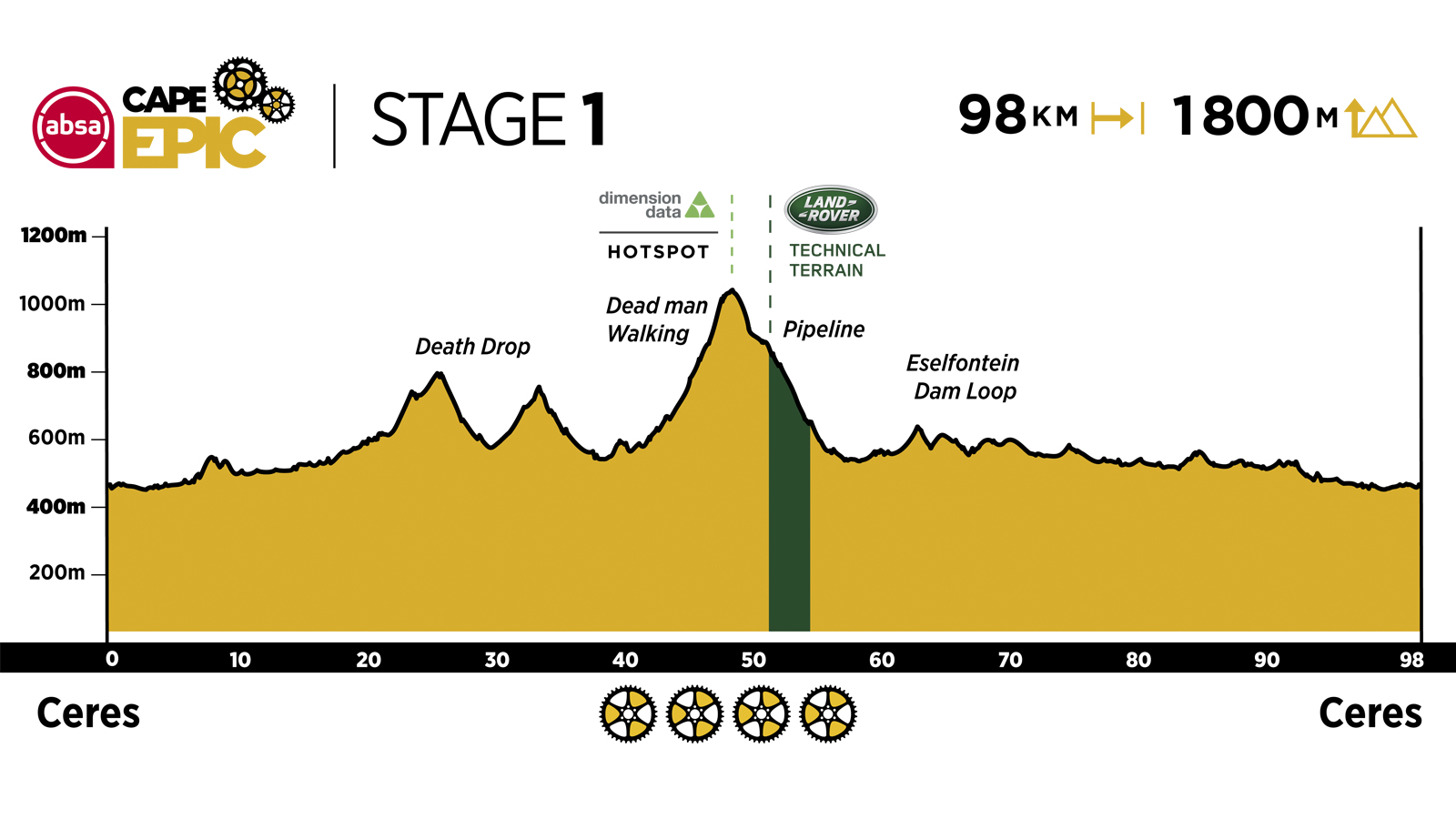
Monday, 16 March 2020: 98km/1800m
The Koue Bokkeveld region of Ceres is known for its Jekyll and Hyde personality, delivering a combination of steep climbs and exhilarating singletrack, set upon a bed of sand and rocks.
No free kilometres are expected here but there is some reward in the form of the Eselfontein trails, a mountain biking playground that features some of the oldest trails in South Africa. In true Cape Epic fashion, three testing climbs await, including the brutally steep and aptly named Dead Man Walking climb, the gradient of which kicks up to 15 per cent in places.
Stage 2: Ceres - Tulbagh
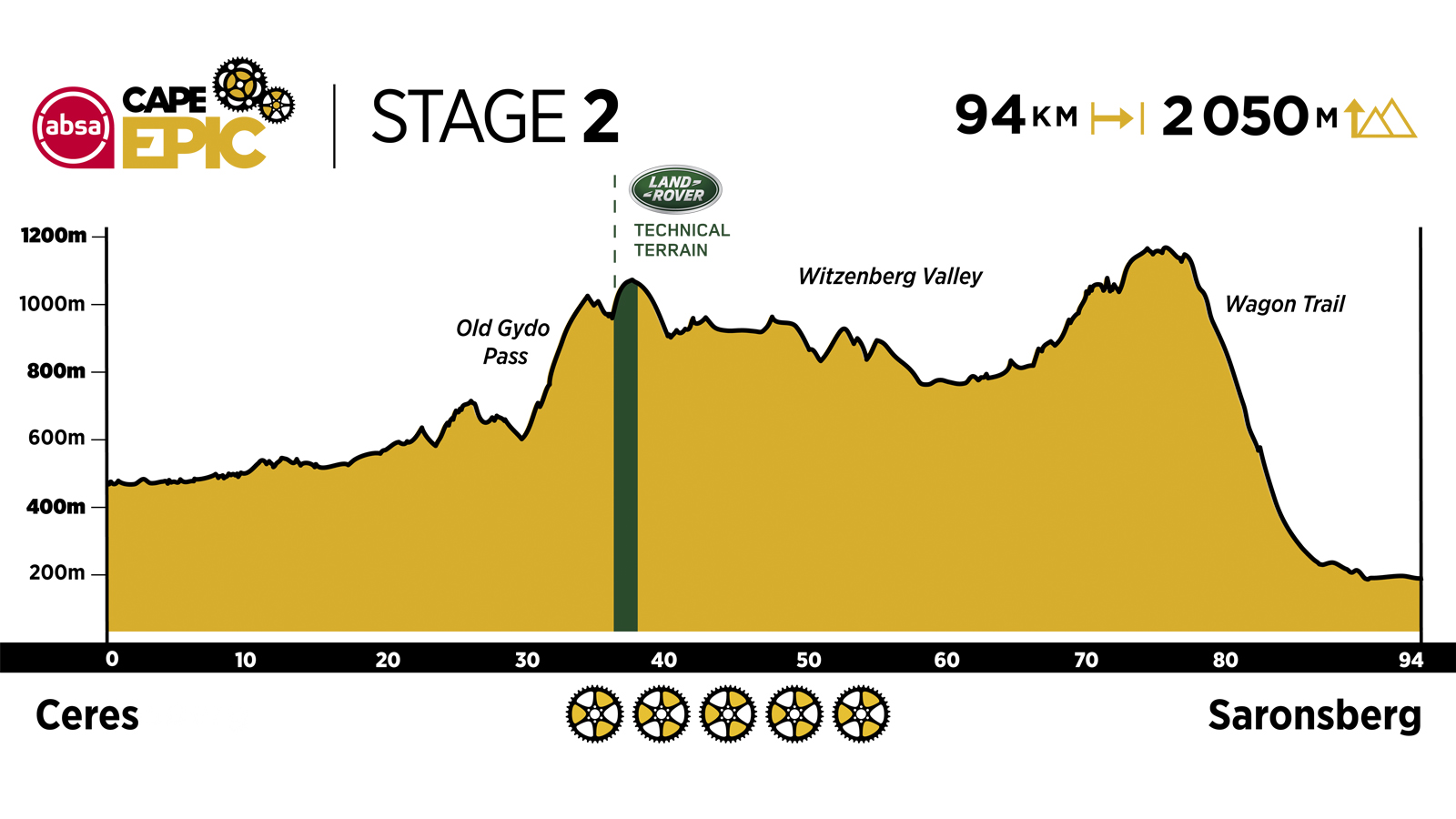
Tuesday, 17 March 2020: 94km/2050m
The Queen Stage doubles up as the first move day of the 2020 race. With 2050m of vertical ascent spread over just 94km, riders are in for a tough day.
The initial part of the stage will play out in the Ceres Valley, known for taking no prisoners - both in terms of exposure to the elements and topography. Then comes the old Gydo Pass which is not a particularly tough climb but its exposed nature could pose an issue if the weather takes a turn for the worse.
Once at the top, the Bokkeveld plateau will bring with it a true test of skills and mettle - rocks, sand and incredibly technical singletrack play on repeat. Summiting the final climb of the day will bring a false sense of relief as the Ox Wagon trail descent - a section that featured in 'stage 100' of the 2016 Cape Epic - will test even the most skilled professionals.
Stage 3: Tulbagh
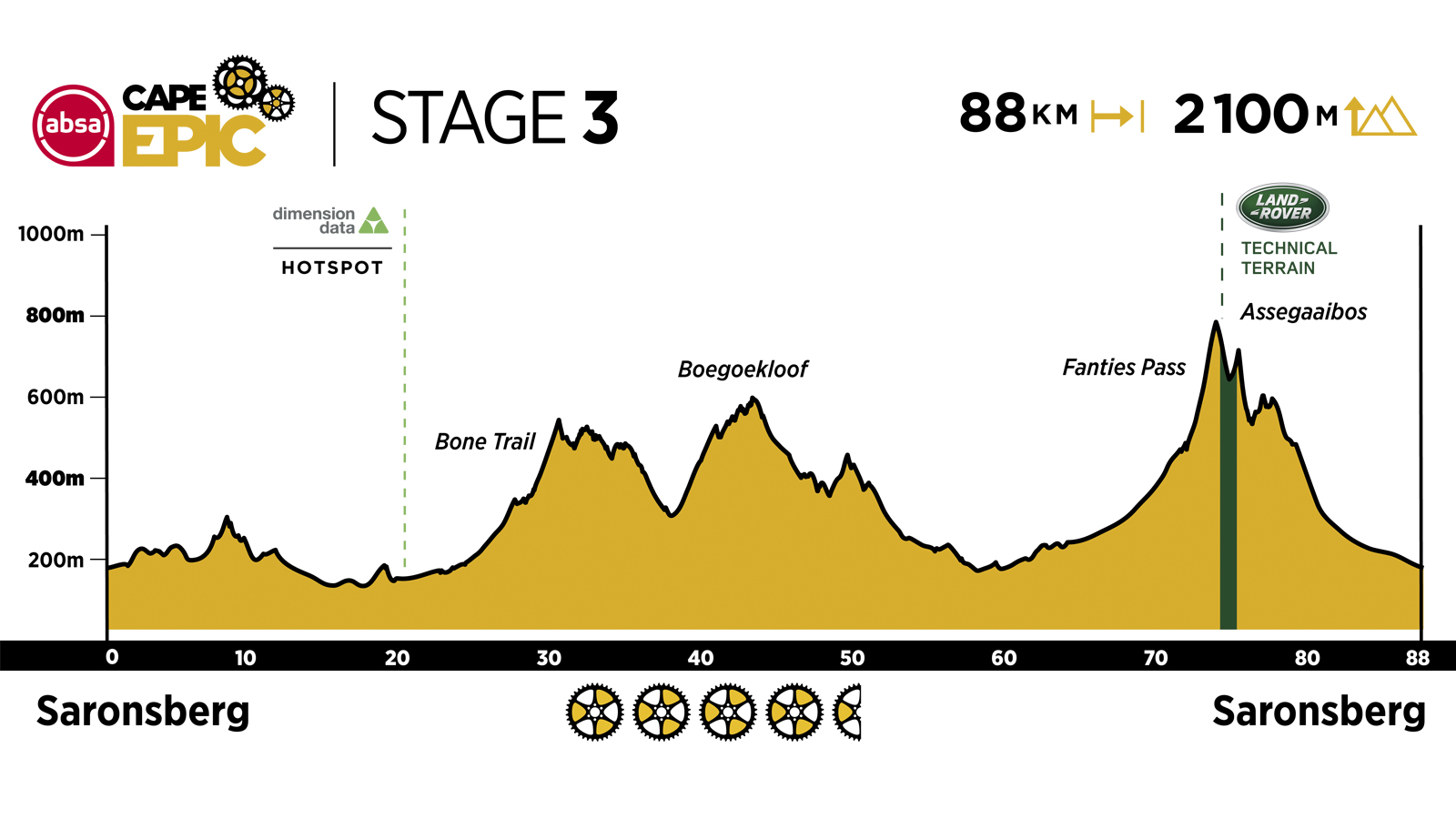
Wednesday, 18 March 2020: 88km/2100m
With 2100m packed into 88km, stage 3 could easily pass as another Queen Stage. Its difficulty, however, lies in the hands of the weather gods and, if the wind blows like it did in 2016, riders can expect another tough and brutal day in the saddle.
Three major climbs define the route profile: the Bone Trail, Boegekloof and Fanties Pass - the latter of which tops out at over 20 per cent and averages 14 per cent for the final two kilometres. It's not all doom and gloom: myriad singletrack and exhilarating natural trails comprise much of the stage with the purpose-built Assegaaibos trails traversing indigenous forests and unspoilt fynbos gardens.
Stage 4: Tulbagh - Wellington
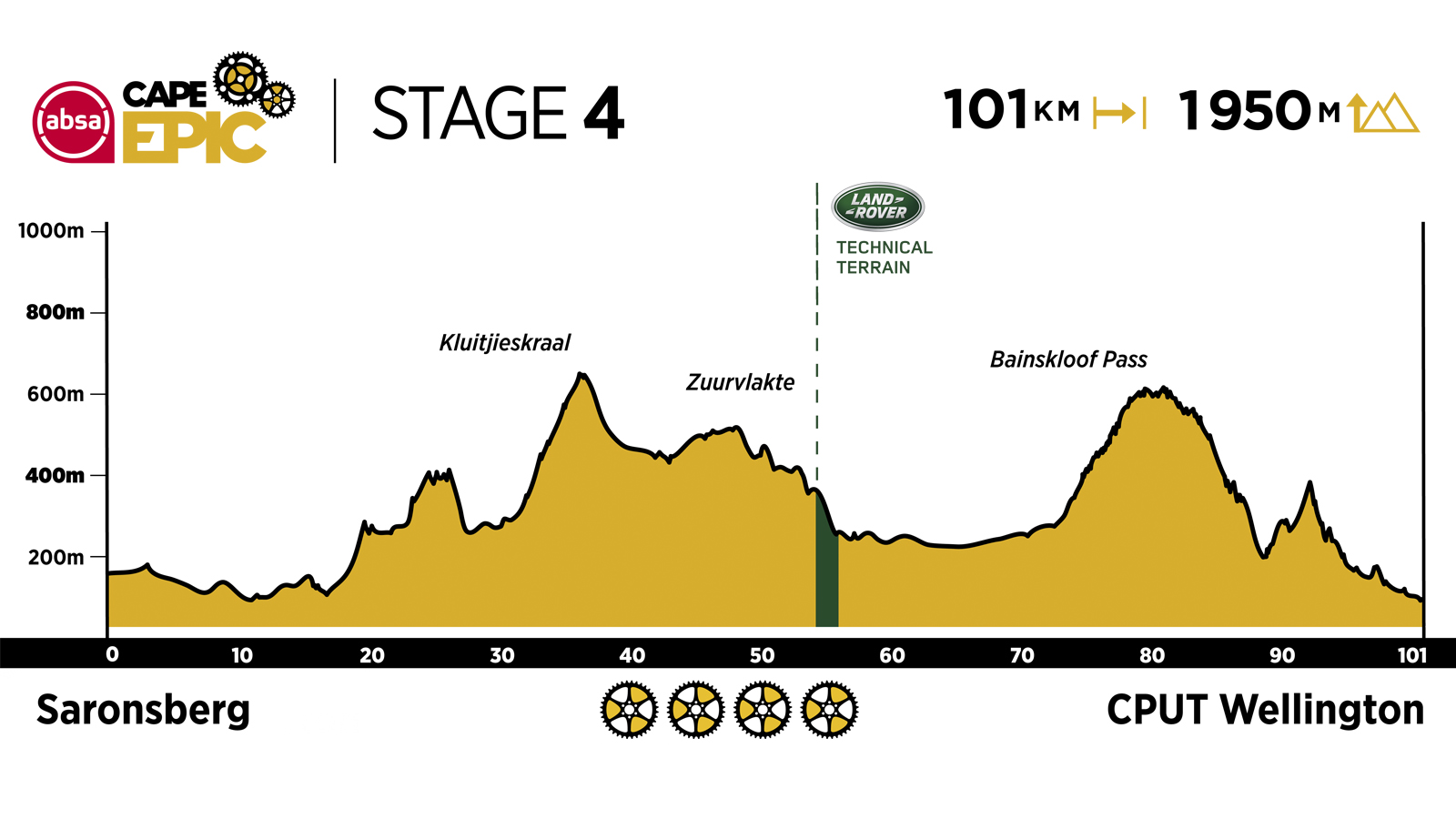
Thursday, 19 March 2020: 101km/1950m
The second move day of the 2020 Cape Epic also happens to be the longest stage of the race, and plots a similar trajectory to stage 3 of the 2016 edition. The Zuurvlakte, which form a pan almost entirely surrounded by high mountains, features old forestry roads which will be sandy, rutted and very rocky - the riding here is expected to be hard and bone-jarring.
This is another stage where the wind could play a defining role as the open expanses of the Vlakte will provide no shelter. The only respite comes in the form of the Bainskloof Pass and its asphalt surface, before a series of unrelenting and appreciably steep vineyard tracks finish off the day's proceedings.
Stage 5: Wellington
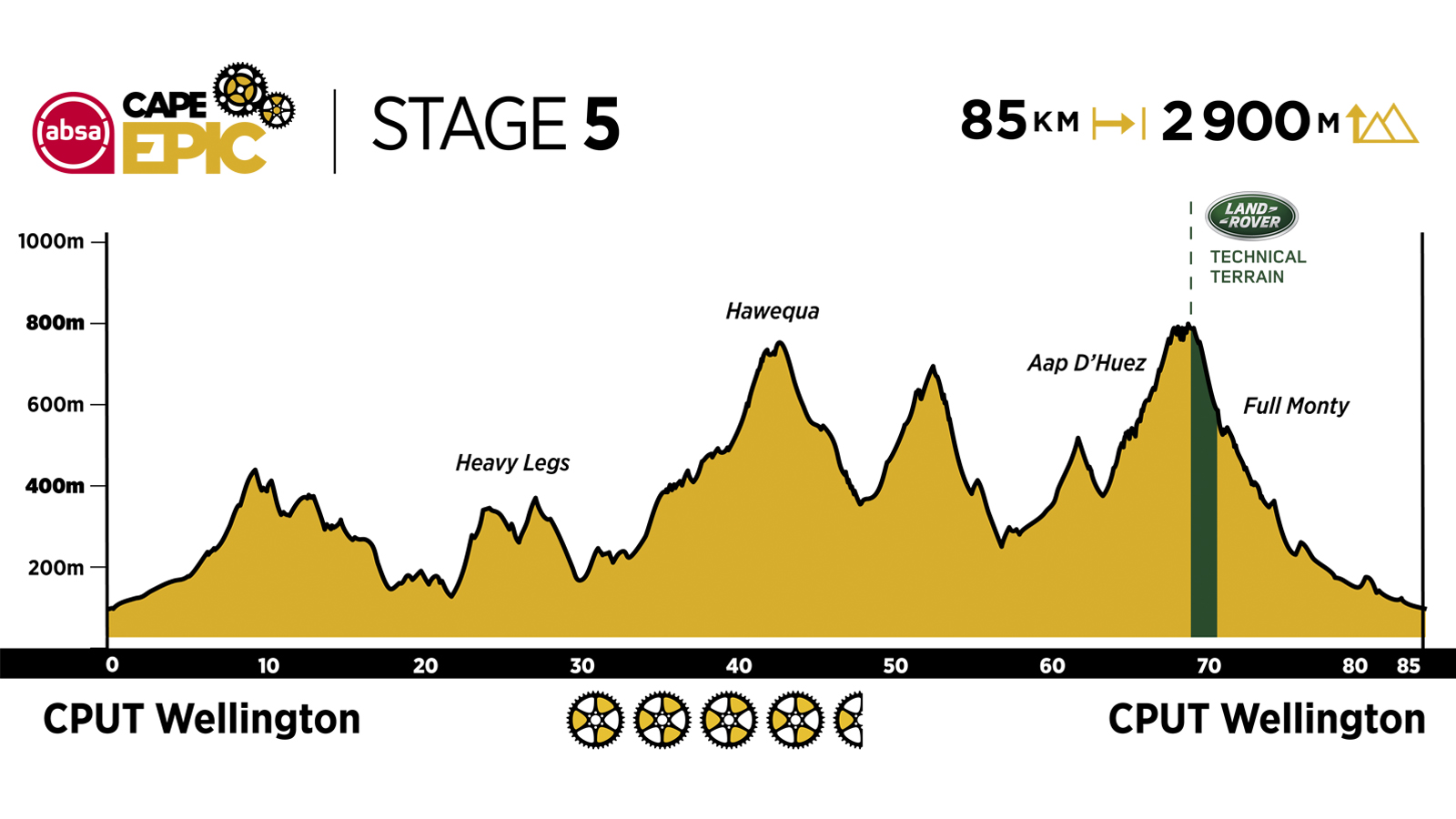
Friday, 20 March 2020: 85km/2900m
Stage 5 can only be described as a monster, with nearly 3000m of vertical gain crammed into just 85km - a veritable big day out. The previous five days of hard riding will make it an even tougher challenge with five notable 'bumps' that result in a shark-tooth-like route profile.
That said, there's a lot of singletrack on offer - a just reward for all the vert and hurt. The final hurdle of the day up the 21-switchbacks of the Aap d'Huez singletrack climb signals the real fun as the scintillating trails in and around Wellington plots a fast and furious run into the finish via the Full Monty roller-coaster. In true Cape Epic fashion, expect a good couple of stings in the tail.
Stage 6: Wellington
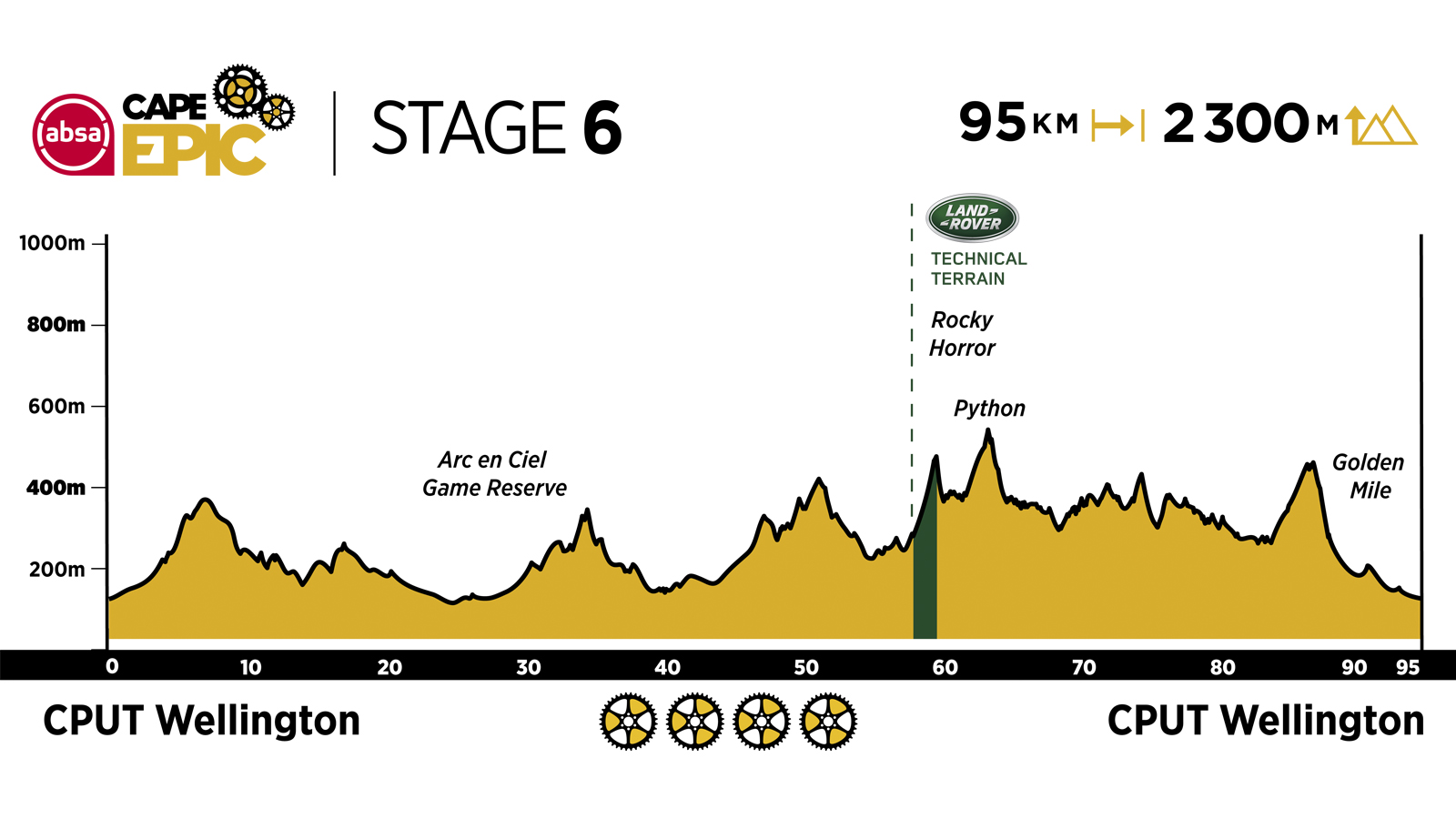
Saturday, 21 March 2020: 95km/2300m
Stage 6 is a relatively straight-forward day around the Wellington Valley. While not easy by any stretch, there's more reward on offer than any other stage.
A dash through the Arc en Ciel private nature reserve will dish out sightings of zebra, eland, springbok and giraffe before the real climbing begins: steep, vineyard roads and abundance of singletrack in and around the Wild Boar trails, a mountain biking paradise formally known as Welvanpas. At this point there's still plenty of climbing left to do, including Rocky Horror - a nasty ascent made up of 'babyhead-like' rocks that requires modulated power delivery and momentum to effectively negotiate.
Stage 7: Wellington - Val de Vie, Stellenbosch
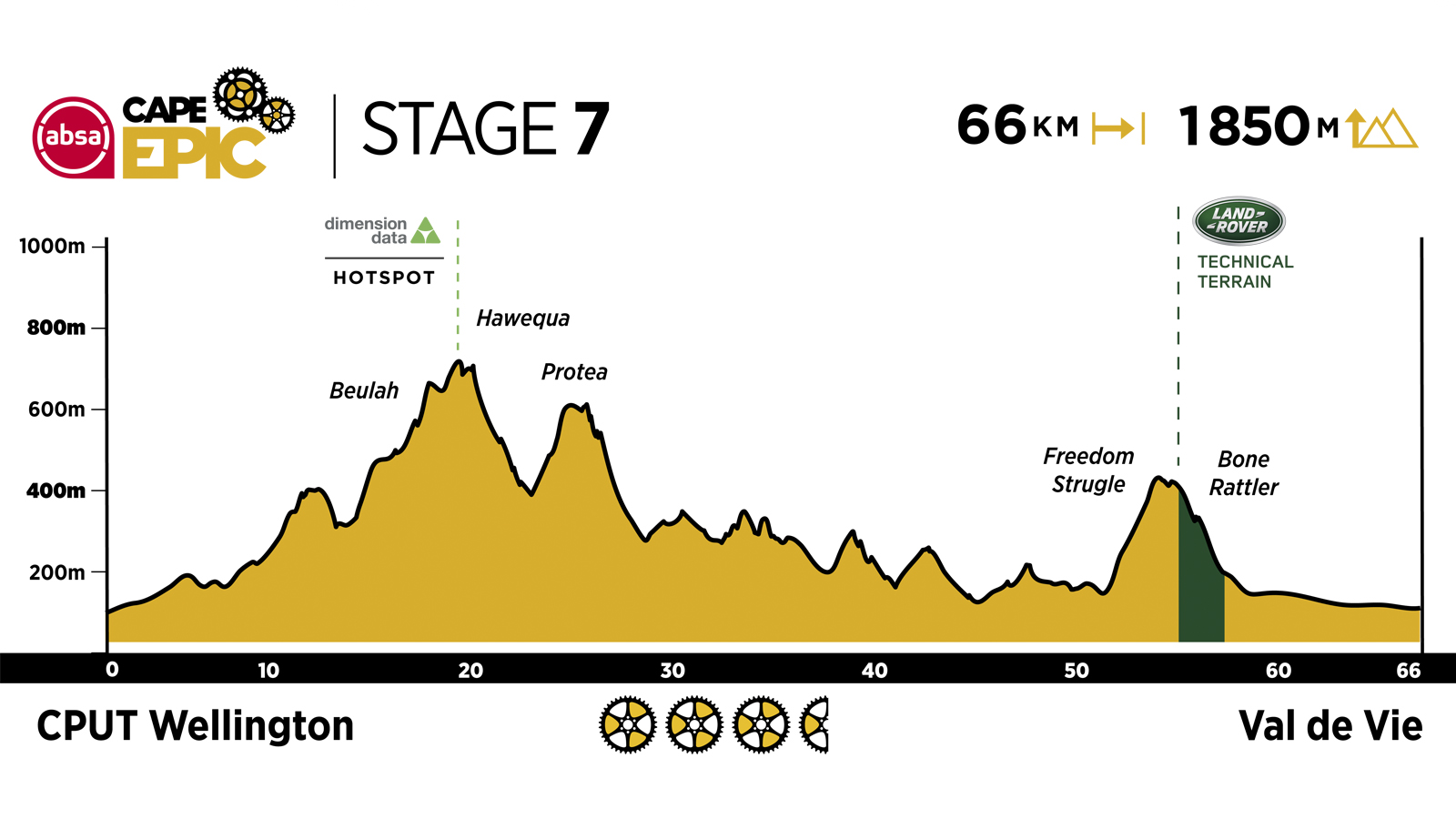
Sunday, 22 March 2020: 66km/1850m
It might be just 66km in distance but the route to Val de Vie Estate in Stellenbosch is a lot tougher than it looks.
The now-famous Patatskloof, Beulah and the Hawequa climbs have become staple features on the last few editions of the race but they aren't the only bumps along the way. A series of short-yet-steep climbs punctuate the final 30km, the terrain of which is tricky, loose and sandy - no free kilometres here. The final hurdle? The Freedom Struggle climb and Bone Rattler descent combo, which signals the procession into the finish at Val de Vie Estate.
Aaron was the Tech Editor Cyclingnews between July 2019 and June 2022. He was born and raised in South Africa, where he completed his BA honours at the University of Cape Town before embarking on a career in journalism. Throughout this career, Aaron has spent almost two decades writing about bikes, cars, and anything else with wheels. Prior to joining the Cyclingnews team, his experience spanned a stint as Gear & Digital editor of Bicycling magazine, as well as a time at TopCar as Associate Editor.
Now based in the UK's Surrey Hills, Aaron's life revolves around bikes. He's a competitive racer, Stravaholic, and Zwift enthusiast. He’s twice ridden the Cape Epic, completed the Haute Route Alps, and represented South Africa in the 2022 Zwift eSports World Championships.
Height: 175cm
Weight: 61.5kg
Rides: Cannondale SuperSlice Disc Di2 TT, Cannondale Supersix Evo Dura-Ace Rim, Cannondale Supersix Evo Ultegra Di2 Disc, Trek Procaliber 9.9 MTB
